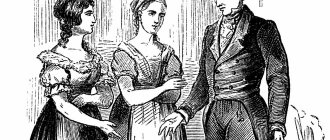- Essays
- On literature
- Griboyedov
- Themes and problems of the comedy Woe from Wit (problems of the work)
In his play “Woe from Wit,” which is still relevant today, A. S. Griboyedov posed many problems of contemporary reality. The author touches upon not only universal themes such as love, family, moral values, but also topical issues for that period: serfdom, veneration of rank, upbringing and education. He was able to describe the era of the late 1810s and early 1820s.
The main problem of the work, stated in the title, is the problem of the mind. The author calls his work a story about “25 fools and one smart person.” Smart people, like Chatsky, have always aroused and will arouse hatred among the “kings” of society. The Famus society expels Chatsky, calling them madmen, although they themselves do not shine with intelligence. It is the mind, combined with sincerity and honesty, that becomes the reason for its misunderstanding by others. Hence the grief from the mind.
The problem of upbringing and education is closely related to the problem of the mind. Education for the “past century” is not only unnecessary, but even dangerous.
The problem of honor is also raised in the work. Chatsky, a man of honor, is expelled from society, and people like Molchalin, liars and flatterers, continue to exist in it.
The problem of life values is another problem revealed in the work. Chatsky sees the meaning of life in serving high social ideals, and Molchalin sees it in “winning awards and having fun.”
Another problem is closely connected with the image of Molchalin - veneration of rank. At a young age, his father gave him the advice that in order to advance in his career, he must always please. Therefore, the hero lives like this, using Sophia for selfish purposes. Such careerism, associated with hypocrisy, does not allow honest people like Chatsky, who does not accept service, to occupy high places, and simply destroys people like Sophia.
Griboyedov also touches on the problem of the development of national culture. Famus society is trying to imitate foreign countries in everything. Chatsky, having been abroad, returns to his homeland in order to use all the best from abroad for the development of his country.
Despite the attempt to imitate everything foreign, Famus society lives according to old traditions. This is how the problem of serfdom arises. The past century has become accustomed to not treating peasants at all and exchanging them for greyhounds.
Thus, A. S. Griboyedov in his work “Woe from Wit” raises a variety of problems related not only to that time, but also to our modernity.
Option 2
As A.S. himself wrote about his comedy. Griboyedov: “In my comedy there are 25 fools for one sane person.” The main problem raised in comedy is the confrontation between stupidity and intelligence. The title of the satirical work directly tells us this. It cannot be ignored. This problem is quite deep, so it cannot be left without due attention and detailed analysis.
The original title of the comedy was “Woe to Wit.” A little later it was changed to the more sonorous “Woe from Wit.” Why did the author change the title?
This was done because the original title directly stated that in the 19th century any intelligent person would have to endure reproaches and misunderstandings.
Griboyedov wanted to convey a slightly different meaning to the title. He wanted to emphasize that an inspired and intelligent person can cause harm to himself from society. The full essence of the play is more fully reflected in the title “Woe from Wit.”
The conflict on which all satire is based takes its basis from the confrontation between the old and new centuries. Chatsky communicates a lot with Old Moscow society. In conversations, he outlines his belief systems, cultural heritage, opinions about education, family, honor and conscience.
Famusov and the entire Famusov society is a representative of the old century. In their worldview, a successful person should have money and a high position. They prefer obliging and worshiping rulers. This way they climb the career ladder and earn a good reputation. Such actions were repeatedly committed by Famusov and representatives of his society. They are more concerned about other people's opinions of themselves, a good reputation, than simple human happiness.
Molchalin is a representative of the younger generation. But his views are no different from Famus society. He adheres to the old-time ideal of the feudal landowner. For them, having their own opinion and trying to defend it is simply unacceptable. This way he will lose his good reputation. In society he is considered an excellent student of Famusov. He flirts and makes the owner's daughter fall in love with him. He himself does not experience any feelings for her, but is only trying to maintain his “prestigious” position due to this.
All the heroes of “Woe from Wit,” with the exception of Chatsky, can be characterized by the following qualities: love of money and rank, priority of other people’s opinions. The main character does not understand their mentality. His motto: “serve the cause, not individuals.”
Sophia, the daughter of the owner of the house, is unrequitedly in love with Mochalin. He treats her very meanly, flattering her for a higher position. Chatsky, as a childhood friend, is also not indifferent to her. But she reproaches him and does not like him. This is a clear example of the detrimental effect this lifestyle can have on the feelings and lives of many.
The problem of morality in A. S. Griboyedov’s comedy “Woe from Wit”
“Woe from Wit” is the noblest humane
work..., a protest against the vile racial
reality, against officials, bribe takers,
libertine bar... against ignorance,
voluntary servitude.
V. G. Belinsky
The attitude towards the human person, towards its dignity, towards work, towards honor and dishonor, towards truth and lies, towards love and friendship - these are problems that are relevant at all times.
People today still think about the questions: how to live? What does it mean to have human dignity? who deserves trust, love, friendship? How to raise worthy members of society?
Life itself gives the answers. They are also given by books in which wise people - writers - share their life experiences with us. “A poet in Russia is more than a poet,” E. Yevtushenko said a century and a half after Griboyedov, but it was as if he was also talking about him, a wise teacher, mentor and friend.
A. S. Griboyedov was a Decembrist by conviction. He considered the existing system not only unjust, but also deeply immoral, destroying the human personality. Hence the enormous attention he paid to moral problems in the comedy “Woe from Wit.” We learn these lessons by analyzing the behavior and relationships of comedy heroes and coming to the conclusion that a person’s morality is largely determined by the society in which he lives and whose interests he protects. Let's enter the house of the official master Pavel Afanasyevich Famusov, and plunge into a life that is already far from us. Here the elderly owner of the house flirts with a young servant, here he recalls his only two known relationships with a widow doctor and immediately boasts that he is “known for his monastic behavior.” Soon we will get to know his “code of honor” in more detail. Famusov openly admits that in the service he likes to “please a loved one”, without thinking about the benefits of the matter, he treats his duties formally (“Signed - so off your shoulders!”). He is immoral in everything: he is indifferent to raising his daughter, he is afraid of enlightenment, he is sure that all evil comes from him, and “to stop evil, he would take away all the books and burn them.”
Famusov does not consider serfs to be people and takes his anger out on them. And at the same time, he considers himself sinless and sets an example for his daughter: “You don’t need another example when you have the example of your father in your eyes.”
Famusov evaluates people by wealth, rank and how convenient they are for him. Therefore, he keeps the hypocrite and sycophant Molchalin in the house, trying not to notice his falsehood, lies, and servility (after all, Famusov is not stupid at all!). Therefore, he ingratiates himself with Skalozub (even: “And the golden bag, and aims to become a general”).
Skalozub is so primitive that he does not even understand what he is saying when he admits that he is “happy in his comrades”, because they have been “killed” and, therefore, the path to promotion has been cleared. Nevertheless, he is an honored guest in Famusov’s house! The swaggering, influential Khlestova matches him. The morality of the Tugoukhovskys is terrible, for whom only one thing is important in a person - wealth.
In this society they don’t even think about human dignity, friendship, love. To achieve selfish, base goals, it is not considered shameful to lie, be hypocritical, or pretend. “The path to the top” is perfectly illustrated by the example of Molchalin, who, living as “his father bequeathed,” that is, pleasing “all people without exception,” destroyed the person in himself. He is sure that at his age “one should not dare to have one’s own opinion,” that “one must depend on others,” etc.
The question arises whether Sophia is immoral, having fallen in love with such a person. Does she really like Molchalin’s “morality”? How could she, who reads, loves music, and is not stupid, prefer this nonentity to Chatsky? I cannot blame Sophia: I feel sorry for her. The girl is very young and inexperienced. She received an ugly upbringing in her father's house. Having read sentimental French novels, she imagined herself to be a savior, the patroness of a poor young man, so quiet, so modest... If only she had known that this was a wolf in sheep's clothing. But Sophia has not yet learned to understand people: Molchalin is good to everyone, sighs, is afraid to raise his eyes to her... And Chatsky is sharp, sarcastic, makes fun of everyone and at the same time seeks understanding from her, Sophia. She is sure: Chatsky doesn’t need her, and she doesn’t care about him. Sophia is not immoral. Her love, unlike Molchalin’s “feelings,” is real. Now, if only she could see her chosen one through the eyes of an outside observer! Sophia’s behavior is the result of the influence of the environment, society, for which Molchalin’s “moderation and accuracy” are the key to success and career. Immorality does not hinder, but helps to move up the career ladder, and favors the “powers of this world.” Material from the site //iEssay.ru
Talking about the personal drama of Chatsky and Sophia, the writer convinces that in problems of morality, Famus society is hopelessly behind the demands of life. The political and moral failures of this society are interconnected. Defenders of serfdom cannot respect human personality. Numerous Famusovs, Khlestovs, and Skalozubs despise Russian culture, folk customs, and native language, as they fear enlightenment like fire.
But what is most frightening is their progressive views. “He wants to preach freedom!” - “He doesn’t recognize the authorities!” - such accusations in their mouth sound like a sentence. In the fight against freethinking, the most immoral means are good for them. Gossip, lies, slander are used without a twinge of conscience when the threat to their peace that Chatsky brings with him becomes obvious. Chatsky appears not only as a bearer of new ideas, but also as a man of new morality; his moral principles are as opposed to the morality of the old lordly Moscow as his convictions.
The idea of the need for social change is very convincingly revealed in the comedy through the contrast of the morality of two opposing camps: in a backward, outdated society there cannot be high morality - this was the conclusion the reader of “Woe from Wit” made for himself on the eve of the Decembrist uprising. This conclusion remains true today: fair public morality is possible only in a just society.
Didn't find what you were looking for? Use search ↑↑↑
On this page there is material on the following topics:
- moral of the story woe from mind
- woe from mind the problem of moral choice
- woe from mind problems of the work
- attitude to wealth and rank in the comedy Woe from Wit
- the problem of "mind" in Griboyedov's comedy Woe from Wit
Essay Themes and problems of the comedy Woe from Wit
In the comedy “Woe from Wit” by Alexander Sergeevich Griboyedov there are many themes and problems characteristic of that time. It was because of such themes that the work was banned from publication, and it was not allowed to be staged in the theater.
There are quite a few problems in the work. Griboedov was not afraid of censorship and considered all the problems of that society. It is necessary to consider each topic and problem separately. To begin with, the huge problem of that time was serfdom and the fact that the landowners treated the peasants very cruelly. No normal person could calmly tolerate serfdom. Griboyedov also did not like his upbringing, and how education was taught to nobles. It should not be that if a person has money, then he will receive the best education, and if there is no money, then the education will be bad.
Another problem in that society was that the military did not want to fight for their country and preserve the health and peace of citizens. They only wanted to receive the highest titles and ranks. Also, every military man wanted to receive many awards and have a lot of money.
We can conclude that the work “Woe from Wit” is associated with the Decembrists. This comedy fully described the Decembrist uprising.
The author touches not only on such social topics, but he also writes about love, marriage and family. Of course, almost the most important topic is Chatsky’s drama. He loves Sophia, but she refuses to reciprocate. After all, Sophia will not be able to escape Famus’ society. She will never be able to fall in love and be with Chatsky.
Griboyedov touched upon an important problem in his work “Woe from Wit”: the fact that the old society cannot accept people from the new world. These are people who have their own worldview that is different from the rest of the people in that society. They live a free life and do not depend in any way on the opinions of other people. They enjoy their life and will not conform to others in order to be respected and not humiliated.
And one of the most serious problems that can be seen in comedy is the problem of the mind. The author himself sometimes called his work about a large number of fools and one truly smart person. Smart people, such as Chatsky, in such a society were hated by the rest of the population. The Famus society is trying to drive Chatsky out, calling him crazy, although they themselves are not smart people at all. Chatsky is too smart for such people and therefore he has no place in such a society.
Other works: ← Famusov and Chatsky in the work Woe from Wit ↑ GriboyedovChatsky’s attitude towards serfdom in the comedy Woe from Wit →
Problems of the comedy "Woe from Wit"
The problematics of Griboyedov's work are quite extensive. The writer in his comedy raises many topical problems of his time. This caused Griboedov to displease the censorship.
Finished works on a similar topic
Course work: Ideological content and problems of comedy by A.S. Griboyedov “Woe from Wit” 440 ₽ Abstract The ideological content and problems of the comedy by A.S. Griboyedov “Woe from Wit” 220 ₽ Test work Ideological content and problems of comedy by A.S. Griboyedov “Woe from Wit” 220 ₽
Receive completed work or specialist advice on your educational project Find out the cost
The main problems and themes of the work by A.S. Griboyedov are:
- Raising and education of nobles;
- Serfdom, the cruelty of landowners;
- Hostile attitude towards “new people”;
- The pursuit of awards and ranks;
- Confrontation between the “old” and “new” worlds;
- Bureaucracy;
- Arakcheevshchina and Skalozubovshchina;
- Liberalism;
- Decembrism;
- Frenchmania and love for everything foreign.
In addition to these topics, Griboyedov touches on universal themes: love, marriage, family, etc.



